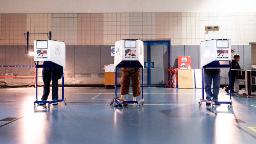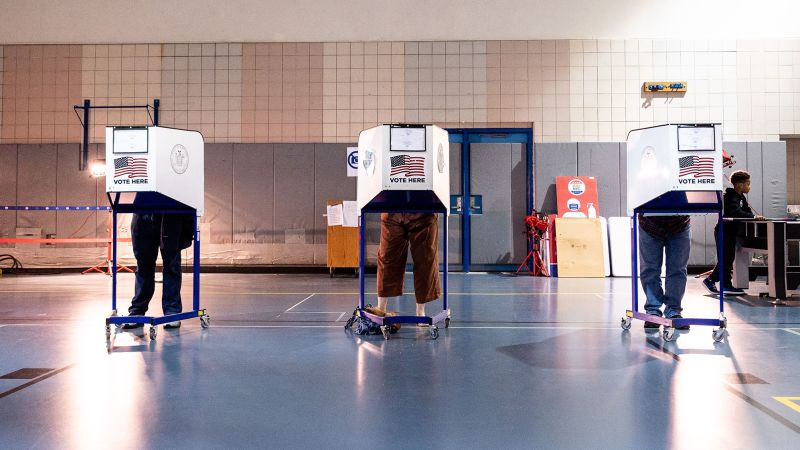Premarket stocks: What midterm elections could mean for the US economy


A version of this story first appeared in CNN Business’ Before the Bell newsletter. Not a subscriber? You can sign up right here. You can listen to an audio version of the newsletter by clicking the same link.
New York
CNN Business
—
Tuesday’s midterm elections come at a time of economic vulnerability for the United States. Recession predictions have largely turned to “when” not “if” and inflation remains stubbornly elevated. Americans are feeling the pain of rising interest rates and are facing a winter filled with geopolitical tension.
The results of Tuesday’s election will determine the makeup of a Congressional body that holds the potential to enact policies that will fundamentally change the fiscal landscape.
Here’s a look at what policy issues investors will pay particular attention to as they digest election results.
Tax changes: Last week, President Joe Biden suggested he may impose a windfall tax on Big Oil companies after they recorded record profits on high gas prices. Republicans would be less likely to approve that windfall tax on oil company profits and also are generally not in favor of tax hikes on the wealthy, reports my colleague Paul R. La Monica.
“What do midterms mean for the markets? If Republicans get the House, tax hikes are dead in the water,” said David Wagner, a portfolio manager with Aptus Capital Advisors.
What about tax cuts? If Republicans do take control of Congress, it would be difficult to enact any major tax reductions without some backing from Democrats or President Biden, meaning there could be grandstanding without much action.
Debt limit: The federal debt ceiling was last lifted in December 2021 and will likely be hit by the Treasury at some point next year. That means it will need to be raised again in order to ensure that America can borrow the money it needs to run its government and ensure the smooth operation of the market for US Treasuries, totaling roughly $24 trillion.
A fight seems to be brewing between Democrats and Republicans. House Republicans indicate that they may ask for steep spending cuts in exchange for boosting the ceiling.
If the government ends up divided and brinkmanship continues, there could be bad news for markets. The last time such gridlock occurred, under the Obama administration in 2011, the United States lost its perfect AAA credit rating from Standard & Poor and stocks dropped more than 5%.
Spending: Democrats have indicated that they intend to focus on parts of the fiscal agenda proposed by President Biden in 2021 that have not yet become law, including expanding health coverage and child care tax credits. A Republican win or gridlock could table that. Goldman Sachs economists also note that a Democratic victory could likely increase the federal fiscal response in the event of recession, while Republicans would be more likely to avoid costly relief packages.
Social Security: Popular programs like Social Security and Medicare face solvency issues long-term and the topic has become a hot-button issue on both sides of the aisle. The topic is so closely watched that even debating changes could impact consumer confidence, say analysts.
Democratic Senator Joe Manchin said last week that spending changes must be made to shore up Social Security and other programs which he said were “going bankrupt.” He said at a Fortune CEO conference that he was in favor of bipartisan legislation within the next two years to confront entitlement programs that are facing “tremendous problems.” Republican Senator Rick Scott has proposed subjecting almost all federal spending programs to a renewal vote every five years. Analysts say that could make Social Security and Medicare more vulnerable to cuts.
The Federal Reserve: Lawmakers have been increasingly speaking out against the pace of the Federal Reserve’s interest rate hikes meant to fight inflation. Democratic Senators Elizabeth Warren, alongside Banking Chair Sherrod Brown, John Hickenlooper and others have called on Fed Chair Jerome Powell to slow the pace of hikes.
Now, Republicans are getting involved. Senator Pat Toomey, the top Republican on the Banking Committee, asked Powell last week to resist buying government debt if market conditions remain subdued. Expect more scrutiny from both parties after the elections.
The stock market under President Biden started with a boom, but as we head into midterm elections, markets are going bust, reports my colleague Matt Egan.
As of Monday, the S&P 500 has risen just over 13% since Biden took office in January 2021. That marks the second-worst performance during a president’s first 1,022 calendar days in office since former President Jimmy Carter, according to CFRA Research.
Out of the 13 presidents since 1953, Biden ranks ninth in terms of stock market performance through this point in office, besting only former Presidents George W. Bush (-21.6%), Carter (-2.6%), Richard Nixon (-7.2%) and Lyndon Johnson (+9.6%), according to CFRA.
By contrast, Biden’s two immediate predecessors headed into their first midterm election with stock markets surging. The S&P 500 climbed 58.5% during the first 1,022 calendar days in office for former President Barack Obama and 36.2% under former President Donald Trump, according to CFRA.
American consumers borrowed another $25 billion in September, according to newly released Federal Reserve data, as higher costs led to further dependence on credit cards and other loans, reports my colleague Alicia Wallace.
In normal economic times, that would be a concerningly large jump, said Matthew Schulz, chief credit analyst for LendingTree, wrote in a tweet. “However, it is actually the second-smallest increase in the past year.” Economists were anticipating monthly growth of $30 billion, according to Refinitiv consensus estimates.
The data is not adjusted for inflation, which is at decade highs and weighing heavily on Americans, outpacing wage gains and forcing consumers to rely more heavily on credit cards and their savings.
In the second quarter of this year, credit card balances saw their largest year-over-year increases in more than two decades, according to separate data from the New York Federal Reserve. The third-quarter household debt and credit report is set to be released Nov. 15.







